Dark Souls Review
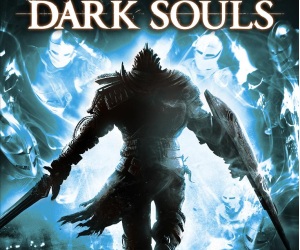 Game: Dark Souls
Game: Dark Souls
Developer: From Software
Publisher: Namco Bandai Games
Available on: Xbox 360 & PlayStation 3 (Reviewed on Xbox 360)
A friend of mine once had a teacher, who we’ll call “Miss Awesome”. Miss Awesome was incredibly strict, had no time for excuses, and expected nothing less than the best from every pupil. Like many strict teachers, Miss Awesome had a keen eye for anyone who was not living up to their potential. If a pupil failed to turn in work, or produced something of unsatisfactory quality, Miss Awesome would break out her Red Pen of Authority and write “See me” on their exercise book. Yet when the pupil in question shuffled towards her desk, eyes downcast, she did not berate them. Instead, she would ask them why their work was below par. Invariably, the child would look at the floor and mumble: “I can’t do it.”
Wordlessly, Miss Awesome would raise her hand and point to a single word, forever emblazoned in huge letters above the blackboard: “YET”.
Strange though it may seem, Dark Souls, the “even harder” spiritual successor to 2009’s Demon’s Souls, a game widely thought to be one of the hardest of all time, is a lot like Miss Awesome. It simply will not accept anything less than total commitment, and it does not mince its words when you fail to meet its exacting standards. “YOU DIED”, it proclaims in vast red letters, when you succumb, yet again, to one of its challenges, before sending you back to the location of your latest save and robbing you of all the souls you collected up until that point. And yet like Miss Awesome, Dark Souls is compassionate, fair and encouraging. “I can’t do it!” you cry, flicking the analogue sticks of your controller in frustration. Dark Souls smiles slightly, puts the sword back in your shaking hand and tells you, wordlessly: “YET”.
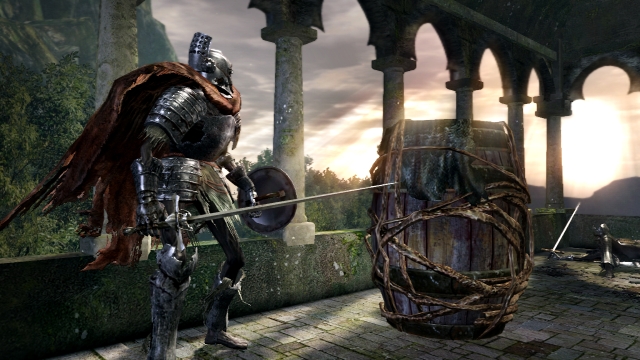
STORY: Although the game’s opening cinematic, a spectacular exercise in dark fantasy excess, sets the scene for your journey, Dark Souls does not have a “plot” in the conventional sense. There are no quests, your motivation is ambiguous, and the eccentric NPCs you encounter seem as isolated from the world as you are. Central story features and pivotal gameplay mechanics are often left unexplained, leaving you to fathom their meaning alone.
Rather than hinder the experience, this disorientating lack of context simply makes the game more intense and introspective. By leaving so much open to interpretation, the game maintains an aura of mystery throughout, and with no story-arc or subplots, your only goal is to progress, moving forward at any cost through an almost unimaginably hostile world.
All you know about your situation at the beginning of the game is that you are branded with the dark mark of the undead, and that “in this land, the undead are corralled and led to the North where they are locked away to await the end of the world”. Although this seems like a bleak prospect (and as the camera pans into your withered, blackened face, looks like one too), an unknown benefactor appears in the skylight high above your head, and throws a corpse down into your cell. The corpse holds a key, and as you retrieve it (the command for looting a body is, delightfully, “Pillage Corpse”), your journey begins.
GRAPHICS: Dark Souls is an utterly beautiful game, though more for its peerless design than for any processor-pushing graphical fireworks. The single, open world is comprised of distinctive environments that nevertheless bleed into each other with a coherence rivalled only in recent years by Red Dead Redemption. Oppressive swamps and dungeons give way (eventually) to desolate mountains and treacherous battlements bathed in the glow of the setting sun. From the acidic bloom of the skies to the iridescent water, an ever-shifting colour palette permeates the medieval fantasy aesthetic at every turn.
As gorgeous as the world is, at the cornerstone of the game is the enemies. Although Dark Souls takes many of its visual cues from a long tradition of dark fantasy, the horrific ingenuity of its monsters betrays a far more original (or diabolical) mind at work. Almost every enemy you encounter on your journey is utterly bizarre, from cats with ridiculously outsized jaws, to hideous scaled insects to horrific entities who appear to be nothing but teeth. Each and every one is terrifying because they are far outside from the comfort zone of recognizable mythical beasts, and their sheer unpredictability is extremely unsettling.
SOUND: The soundtrack, a heart-pounding affair which punctuates orchestral drama with hysterical choral sections, is a perfect match for the action. Like the visuals, Dark Souls’ music is at first familiar within the parameters of fantasy, but manages to surpass its origins at every turn. Beautiful and atmospheric in parts, but exhilarating and awe-inspiring where necessary, the music is worth a listen in isolation, though quite what you would do whilst playing it is anyone’s guess. For their part, the sound effects are suitably squelchy, and there’s a pleasing difference between the noise you’ll hear if you penetrate an enemy with an axe as opposed to a longsword. A great deal of effort has gone into the noises which accompany various pieces of equipment.
Special mention must go to the voices of the NPCs, which are generally British, provincial, and unhinged. As you would expect from people left alone in a desolate world with no-one but the lurching undead for company, the characters you meet on your journey tend to have only the loosest grasp on reality. The script betrays a dark humour, and the more you insist on conversing with the NPCs, the more unsettling the world around you becomes. For a game whose world begins to encroach on your mental health after a few hours, it is a nice touch to have that world populated with characters whose own sanity has long been eroded by it.
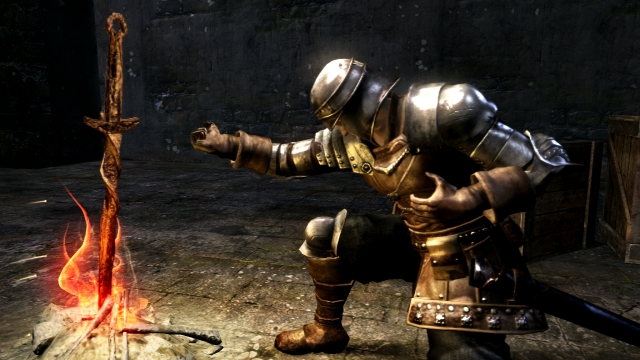
GAMEPLAY: I could give a hundred examples of what makes Dark Souls is so difficult. I could talk about the curses which play havok with your health bar, or the traps that lie in wait for you at every turn. But somehow, the single feature which encompasses all that Dark Souls is, its entire philosophy, is the fact that you can’t pause it. Even pressing the guide button on the Xbox gamepad, an action which you can generally rely on to pause any game at any moment, does nothing to hinder the march of time in Dark Souls’ troubled world.
You see, far from being an arbitrary exercise in making the game harder at all costs, the no-pause clause actually increases the game’s immersion, making you focus far more on your strategy than you do in games where you can freeze the universe on a moment’s whim. If you need a comfort break whilst playing Dark Souls, your only option is to kill all the enemies in the area, ensure nothing is chasing you, and then retire to an enclosed area, as you would if your character were the one who needed the break, not you. This blurs the boundaries between the game and reality, between your avatar and yourself, and thus Dark Souls slowly begins to encroach upon every aspect of your waking life.
An absence of loading screens makes the transitions between areas utterly seamless (though you must elect to enter boss areas), so the overall effect is one of relentless progress. With no levels or quests to break up your journey through Dark Soul’s breathtaking environments, there are no places where it makes logical sense to stop playing. It is a simple enough trick, but we live in the age of the checkpoint, so a game where every “QUIT” feels forced and unnatural worms its way under your skin and stays there like a permanent itch until you are able to return to its seductive world.
Back in the game, things are even more intense. Needless to say, opening the inventory screen doesn’t pause gameplay either, meaning that you’ll have to line up all the equipment you’ll need for an area in advance. You must therefore carefully consider not just your immediate needs, but also the things you may need further down the line. The only way to discover what this will be, of course, is to try, fail, and try again.
Death in Dark Souls is not a punishment, nor is it really something you try to avoid in a traditional gaming sense. Instead, it is both an inevitability and a learning experience. The utter impossibility of surviving any area the first time you navigate it means that you must pass through every area multiple times, learning every corner of the gameworld – and the enemies who lurk there – in astonishing depth. The harder enemies can only be beaten once you have faced them several times, learned their weak spots, memorised their attack patterns and adjusted your inventory accordingly. Because of this, every victory is hard-won, and the sense of accomplishment you feel as an enemy falls would be impossible to replicate if Dark Souls were any easier.
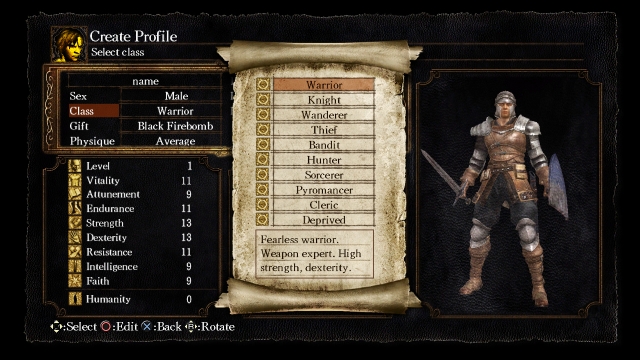
It is only once you begin to understand Dark Souls’ use of the death mechanic that your character’s undead status really begins to make sense. Unlike the majority of videogame deaths, which simply rewind time to a point before your demise as a punishment, Dark Souls’ chronology continues after your death, and you are merely “revived” at your last resting place to continue play. All the “souls” – the life force which enemies release once you kill them, and Dark Souls’ equivalent of XP – you have collected from your last save up until the moment of your death are dropped, so you have a chance to reclaim them by returning to the place where you fell and touching your bloodstain to retrieve them. Should you die before you manage this, the souls will be lost, so you must re-play with care and consideration, learning from your mistakes and improving your technique.
Save points take the form of bonfires, set an enormous distance apart throughout the gameworld. The journey between each one is fraught with peril, but once you reach one, it becomes your sanctuary. It is only at a bonfire that you can level up, cashing in your hard-won souls for stat benefits. You can also mend your weapons (providing you have purchased the appropriate tool), and fill your Estus flasks, Dark Souls’ health power-ups.
It is here that you can “Reverse Hollowing”, offering “Humanity”, a rare commodity dropped by a few enemies to your human state, which opens up a number of abilities. You can “Kindle” the bonfire, making it larger and doubling the number of Estus flasks it can fill, or summon other players or NPCs for help with mighty bosses. However, this also makes your world vulnerable to invasions from assassins, and you will lose your humanity should you be killed. Consequently, deciding when to revert to human form gives the game a crucial strategic edge. Another interesting twist is the fact that merchants demand souls, rather than money, in exchange for their wares. This means that you are not only forced to choose how you will level up or spend your money, but also which of the two will bring you most benefit, since the currency, souls, is the same for each.
At the core of Dark Souls, of course, is the combat. Intensely visceral and with a focus on melee fighting (though you can also wield both ranged weapons and magic), combat is a deep, tactile affair which shifts and develops as your character grows. Although the various classes you choose from at the beginning of the game, a familiar selection of knights, thieves and sorcerers, determine your character’s general direction and starting point, you soon discover that the equipment you choose has a vast impact on the way you fight. As with all good melee combat systems, timing in Dark Souls is everything, and every weapon in the game has its own rhythm, one you must learn if you are to avoid being cut down where you stand.
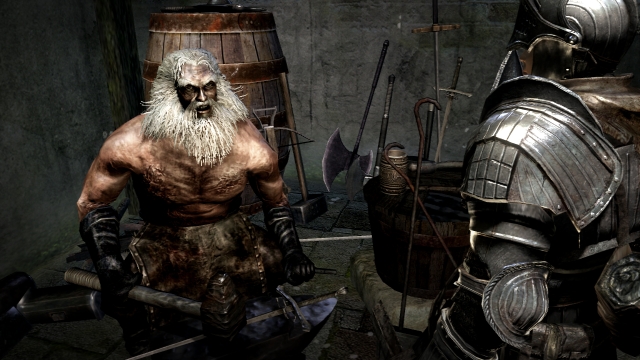
You must plan your attacks carefully, because every move depletes your stamina, leaving you potentially unable to weather blows from your enemies. It should go without saying that an attempt to take on more than two enemies is a poor idea, but because enemies will follow you if they catch sight of you (they are the mindless undead, after all), it is possible to diffuse a group and pick off the front runners one by one. Learning each area and the attack patterns of its enemies is key to success in Dark Souls, and it is only through repetition borne from failure that this can be accomplished. Because you cannot triumph until each weapon, each path and each monster are burned into your memory and the muscles in your fingers, it is impossible to truly leave the world behind when you finally stop playing.
MULTIPLAYER: Dark Souls’ ingenious approach to online play is, peversely, to make it integral to the single player experience. This is accomplished by making every player’s world its own universe, parallel to all the others and visible only through subtle means. For example, players can leave notes in their own gameworld which can then be found by other players, or touch a bloodstain in their own world to view the final moments before another’s death. Ghosts of those who have come before quite literally haunt the world, and watching them carefully can help you avoid an unexpected demise.
By severely restricting the level of freedom players have to express themselves – there is no teamspeak, and you can only choose from a selection of pre-written notes – immersion is never destroyed by modern, real-world voices. Even when you enter another’s world to provide assistance, you do so as a silent guardian.
Although it is possible to act with malicious intent upon another’s world, by leaving misleading notes (for example), the focus of Dark Souls’ online capabilities is upon helping, not hindering others. It is yet another example of the way the game empowers its players, giving them the tools to help themselves (and each other) rather than simply laying down the path for them.
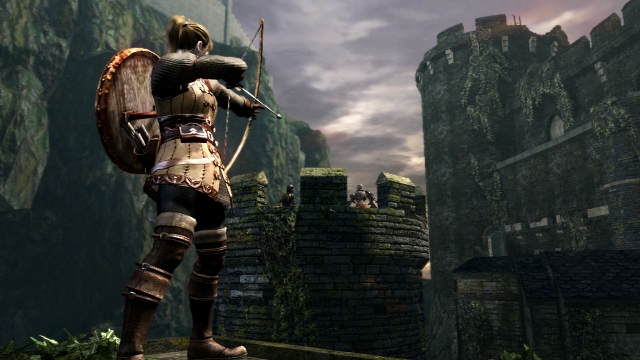
LONGEVITY: It should really go without saying that Dark Souls is an enormous game which will consume your life for months. Not only must each area be mastered, but the game truly rewards exploration, either with tangible rewards or a deeper understanding of the game’s rich universe. Disturbing and occasionally bleak though it undeniably is, the gameworld is a compelling place which you will struggle to leave behind. Hidetaka Miyazaki, the director of Dark Souls, explains that “the endgame is not really the focus at all. In a sense, I dare not require a player to complete the game. There is a completion point, but it’s a game where the user can choose not to complete it, just live in this world for eternity.”
VERDICT: At a time when games fall over themselves to bestow their players with the highest of accolades for the smallest of efforts, Dark Souls stands alone in demanding nothing but the best from those who brave its daunting world. It is telling that there is no difficulty slider to enable you to enjoy its beautiful world with evened odds: the difficulty is the world. Without it, the game’s central motif, that hard-won success should be its own reward, would be meaningless.
The only thing it is really possible to fault Dark Souls for is its utter inaccessibility. For time-poor gamers who look forward to a little escapism at the end of a hard day, Dark Souls will not provide the welcome respite they crave. Yet to criticise a game for doing what it set out to do so perfectly is both foolish and misleading. For anyone who has ever felt themelves skating over the surface of games, never quite finding themselves drawn in, this is the antidote. Dark Souls is not a game to be played, but lived.





